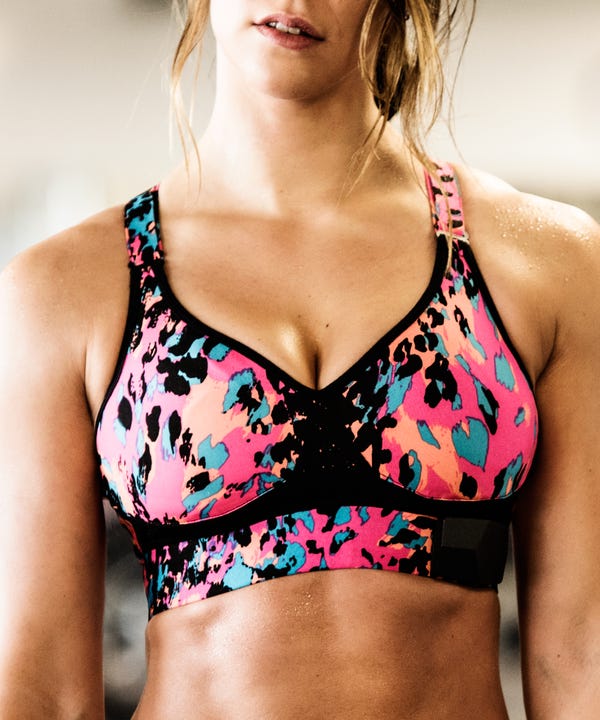 Each year in the first week of January, tech companies congregate at CES in Las Vegas to show off their newest products. We're here to show you what's cool, what's interesting, and what's going to change your life in the year to come.
Each year in the first week of January, tech companies congregate at CES in Las Vegas to show off their newest products. We're here to show you what's cool, what's interesting, and what's going to change your life in the year to come. “It’s more difficult to do a good product for women than it is for men.”
Or at least it is according to Stephane Marceau, the CEO and cofounder of OMsignal, a smart clothing company. OMsignal just announced its first product for women this week, an exercise tracking smart bra called the OMbra. A female team led and designed the OMbra to ensure it matched the aesthetic and functional requirements of a good sports bra, while providing a valuable digital experience for the user.
Women are an increasingly important market for gadget makers. Nielsen estimates women will control two-thirds of consumer wealth over the next 10 years, and spend five to fifteen trillion dollars annually. Tech companies such as OMsignal have realized this, and are racing to perfect products for us. Some are doing a good job, and are truly taking into account a woman's actual wants and needs when it comes to design and features. Others are little more than a shoddy attempt at pink washing. And then there are the strange ones — just, strange.
We rounded up six of the most notable new women-focused products coming out this year, and asked some of our favorite tech writers to share their thoughts.
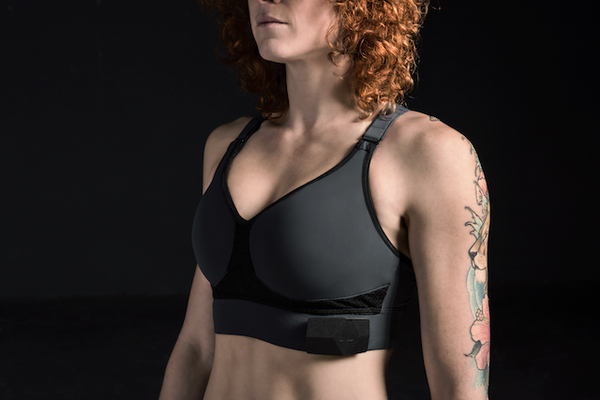
OMsignal OMbra
The OMbra is smart in its tech and customized fit. It has five adjustable positions on the straps, removable padded cups, a double racerback design that shifts pressure from the shoulders to the sides of the bra, and an adjustable hook and eye closure along the bottom band. It works with OMsignal's new running app, providing insights like biometric effort, which quantifies how hard you actually worked based on your heart rate and breathing rhythm. The app also offers post-workout tips or kudos so you can improve in the future, and an in-app fatigue gauge helps make sure you avoid over or under training. Coming this spring, the starter kit is $149, and additional bra only purchases will be $59.
"I love the idea of the OMbra, because it promises to be a great sports bra, as well as a smart one. I’ve tried other sensor packed sports bras that didn’t offer the comfort and support you need while working out, so they failed at their number one job. Maybe the OMbra will succeed."
-Caitlin McGarry, Macworld Staff Writer
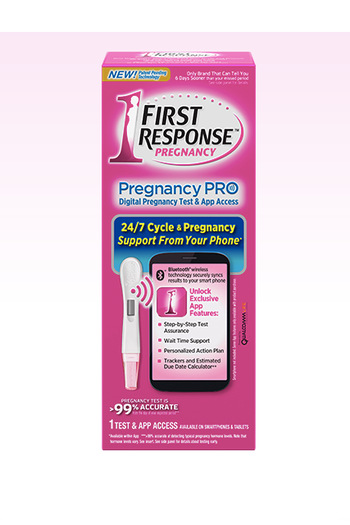
First Response Pregnancy PRO
Pregnancy PRO is a Bluetooth-connected pregnancy test. You attach the stick to your phone, pee on the stick, and then the app lets you know if you've provided enough urine, and if the stick is working properly. It then has a three minute timer, and the app offers ways to keep your mind occupied, or educated, while you wait. A bright pink background means you're pregnant. It costs roughly $20, and will be available at drugstores and on Amazon.
"Taking a home pregnancy test is one of the most private rituals that a woman of child-bearing age can have. It is also one of the scariest and most heart-wrenching experiences a woman can go through. And to somehow turn it into a way to piggyback on the Internet of Things trend strikes me as terribly opportunistic and even a little insensitive.”
-Nicole Lee, Engadget Senior Editor
"I don't see why this product is necessary, or even that helpful. Pregnancy tests don't take that long — it's not like you need an engaging activity to distract you for just a couple minutes — and there are a slew of available resources for women who want them; they're not hard to find. At this point, I'm not convinced that connecting the test to my phone would be useful enough to justify the cost."
-Rachel Metz, MIT Technology Review Senior Editor
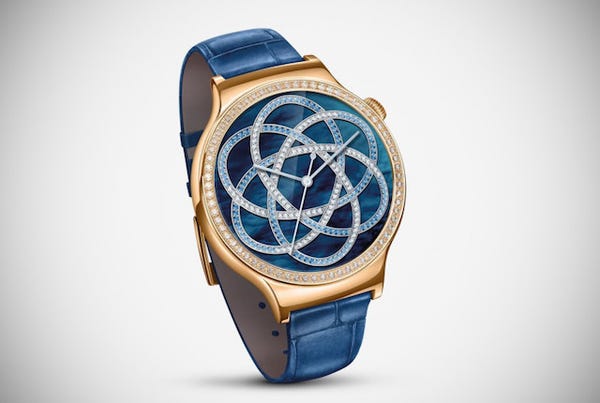
Huawei Jewel
Huawei introduced two Android Wear women's smartwatches developed in partnership with Swarovski, the Jewel ($599, pictured), and Elegant ($499). Jewel includes 68 Swarovski Zirconias, while both feature rose gold-plated watch cases that can be adorned with 40 different watch faces, including 10 "exclusively feminine" designs. The face is sapphire crystal for excellent guard against scratches. The build quality and overall looks are excellent, but the 44mm diameter may be large for small female wrists — unless you dig having a statement watch.
"Ooh, finally a lady watch. To time my fainting spells."
-Heather Kelly, CNN Tech Reporter
"Huawei made the Watch SPECIFICALLY for women. When they introduced it, they specifically called it out for ladies... My only issue is that I’m not fancy enough to justify wearing 68 Swarovski crystals on a smartwatch, but I like that Huawei’s finding its niche in an increasingly saturated smartwatch market."
-Florence Ion, PCWorld and Greenbot Reporter
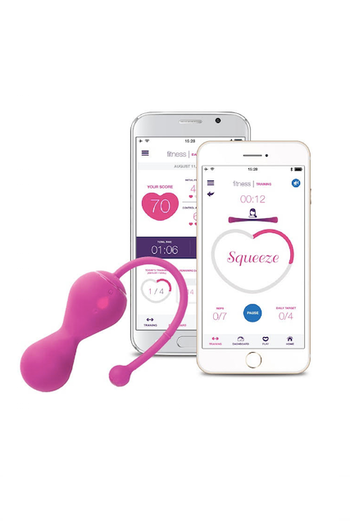
OhMiBod Lovelife Krush
The Lovelife Krush is a connected Kegel tracker that delivers pleasurable vibrations when you're performing them right. The app can guide a woman through these workouts, or be used solely as a sex toy, with the vibrations controlled by a partner over the internet. For someone else to control the device, they've got to answer a question about you correctly, such as, "What's my favorite color?" The $129 device will ship in March.
"OhMiBod was the first kegel exerciser I've tried that provides haptic feedback. It was a lot more difficult than I thought it would be to put enough pressure on the sensors to get the vibrating sensation. I like the fact that it can also be used as a vibrator and sex toy because working out solo might get a bit boring."
-Selena Larson, Daily Dot Journalist
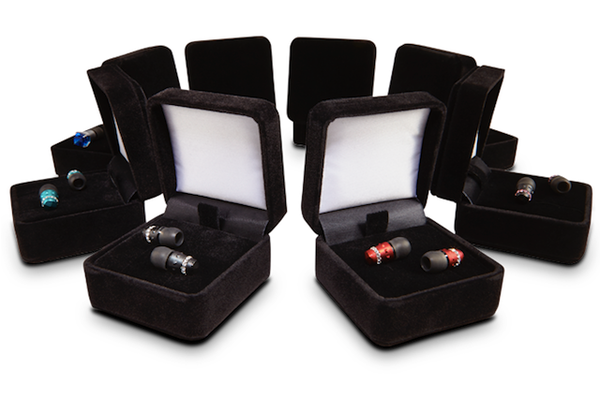
Maroo Audio Ice & Gem Collections
Maroo makes a variety of audio products, but new this year are two lines that cater specifically to female listeners: The bejeweled Ice and Gem collections. The Gem collection is styled like a large precious gemstone stud poking out of your ear canal, while the Ice collection features a ring of smaller crystals for a glittery appearance. Both include five in-ear tips so you can customize your fit (one ear slightly larger than the other? No problem). They are also generally smaller than other earbuds, to accommodate women's generally smaller ear canals. Blocking out external sound is key to maximizing sound quality with this type of headphone.
"I do have smaller ears, so I appreciate when companies offer earbuds that are meant to fit them. But the idea that women want bejeweled earbuds seems very tone-deaf."
-Rachel Metz, MIT Technology Review Senior Editor
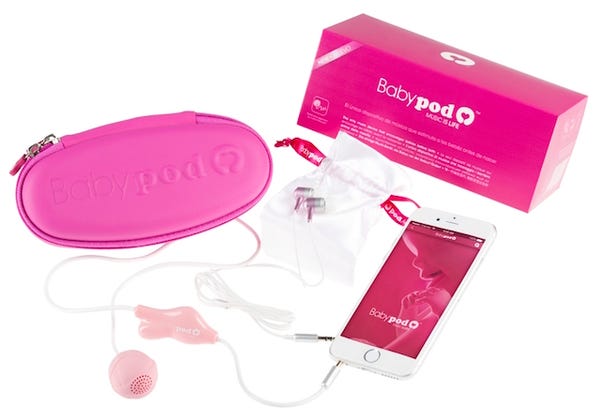
Babypod
If you combined a tampon and an MP3 player, you'd have Babypod, a vaginal insert that plays music for your little fetus. The $135 device is designed to be used from the 16th week of pregnancy on, for 10-20 minutes at a time. It plays at 54 decibels (about the level of a quiet conversation at home), and because it's playing from the birth canal, sound is supposedly more clear than when played generally in the human world. You can stream music to it, or record messages to play to your unborn child. Oddly, the whole setup is wired, so you've got a cord running from your phone into your vagina when you wear it.
"Ugh, can’t we just put headphones on our bellies? That was my first thought, anyway. Sure, this company insists that vaginally delivered music leads to better fetal dance parties. But I still think this is a bad product. For starters, it’s going to be marketed to first-time moms. No one who already has kids running around has time to shove a speaker in their vagina, no mom I know anyway. And first-time moms have enough to worry about, frankly—they’re bombarded from all directions by advice of what to do, what not to do, why they should be worried all the time, about everything. Let’s focus on real problems, of which there are plenty, instead of making pregnant women feel like they have to shove a gadget up their vaginas to bond with their babies."
-Susie Ochs, Macworld Executive Editor
Like what you see? How about some more R29 goodness, right here?
Anonymous Just Declared War On Donald Trump
There's A New Queen Of Instagram (Sorry, Tay)
What You Need To Know About The Latest iPhone 7 Rumours